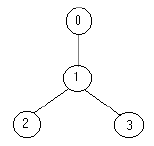Strategic Game
Time Limit: 20000/10000 MS (Java/Others) Memory Limit: 65536/32768 K (Java/Others)
Total Submission(s): 8503 Accepted Submission(s): 4093
Problem Description
Bob enjoys playing computer games, especially strategic games, but sometimes he cannot find the solution fast enough and then he is very sad. Now he has the following problem. He must defend a medieval city, the roads of which form a tree. He has to put the minimum number of soldiers on the nodes so that they can observe all the edges. Can you help him?
Your program should find the minimum number of soldiers that Bob has to put for a given tree.
The input file contains several data sets in text format. Each data set represents a tree with the following description:
the number of nodes
the description of each node in the following format
node_identifier:(number_of_roads) node_identifier1 node_identifier2 ... node_identifier
or
node_identifier:(0)
The node identifiers are integer numbers between 0 and n-1, for n nodes (0 < n <= 1500). Every edge appears only once in the input data.
For example for the tree:

the solution is one soldier ( at the node 1).
The output should be printed on the standard output. For each given input data set, print one integer number in a single line that gives the result (the minimum number of soldiers). An example is given in the following table:
Your program should find the minimum number of soldiers that Bob has to put for a given tree.
The input file contains several data sets in text format. Each data set represents a tree with the following description:
the number of nodes
the description of each node in the following format
node_identifier:(number_of_roads) node_identifier1 node_identifier2 ... node_identifier
or
node_identifier:(0)
The node identifiers are integer numbers between 0 and n-1, for n nodes (0 < n <= 1500). Every edge appears only once in the input data.
For example for the tree:

the solution is one soldier ( at the node 1).
The output should be printed on the standard output. For each given input data set, print one integer number in a single line that gives the result (the minimum number of soldiers). An example is given in the following table:
Sample Input
4
0:(1) 1
1:(2) 2 3
2:(0)
3:(0)
5
3:(3) 1 4 2
1:(1) 0
2:(0)
0:(0)
4:(0)
Sample Output
1
2
Source
最小顶点覆盖,拆点将问题转化为二分图的最小顶点覆盖。
定理:二分图最小顶点覆盖 == 最大匹配
1 //2017-08-26 2 #include <cstdio> 3 #include <cstring> 4 #include <iostream> 5 #include <algorithm> 6 7 using namespace std; 8 9 const int N = 5000; 10 const int M = 1000000; 11 int head[N], tot; 12 struct Edge{ 13 int to, next; 14 }edge[M]; 15 16 void init(){ 17 tot = 0; 18 memset(head, -1, sizeof(head)); 19 } 20 21 void add_edge(int u, int v){ 22 edge[tot].to = v; 23 edge[tot].next = head[u]; 24 head[u] = tot++; 25 26 edge[tot].to = u; 27 edge[tot].next = head[v]; 28 head[v] = tot++; 29 } 30 31 int n; 32 int matching[N]; 33 int check[N]; 34 35 bool dfs(int u){ 36 for(int i = head[u]; i != -1; i = edge[i].next){ 37 int v = edge[i].to; 38 if(!check[v]){//要求不在交替路 39 check[v] = 1;//放入交替路 40 if(matching[v] == -1 || dfs(matching[v])){ 41 //如果是未匹配点,说明交替路为增广路,则交换路径,并返回成功 42 matching[u] = v; 43 matching[v] = u; 44 return true; 45 } 46 } 47 } 48 return false;//不存在增广路 49 } 50 51 //hungarian: 二分图最大匹配匈牙利算法 52 //input: null 53 //output: ans 最大匹配数 54 int hungarian(){ 55 int ans = 0; 56 memset(matching, -1, sizeof(matching)); 57 for(int u = 0; u < n; u++){ 58 if(matching[u] == -1){ 59 memset(check, 0, sizeof(check)); 60 if(dfs(u)) 61 ans++; 62 } 63 } 64 return ans; 65 } 66 67 int main() 68 { 69 std::ios::sync_with_stdio(false); 70 //freopen("inputH.txt", "r", stdin); 71 string str; 72 while(cin>>n){ 73 init(); 74 int u, k, v; 75 for(int i = 0; i < n; i++){ 76 cin>>str; 77 u = 0, k = 0; 78 int ptr = 0; 79 while(str[ptr] != ':'){ 80 u *= 10; 81 u += str[ptr]-'0'; 82 ptr++; 83 } 84 ptr+=2; 85 while(str[ptr] != ')'){ 86 k *= 10; 87 k += str[ptr]-'0'; 88 ptr++; 89 } 90 for(int j = 0; j < k; j++){ 91 cin>>v; 92 add_edge(u, n+v); 93 add_edge(v, n+u); 94 } 95 } 96 cout<<hungarian()/2<<endl; 97 } 98 99 return 0; 100 }